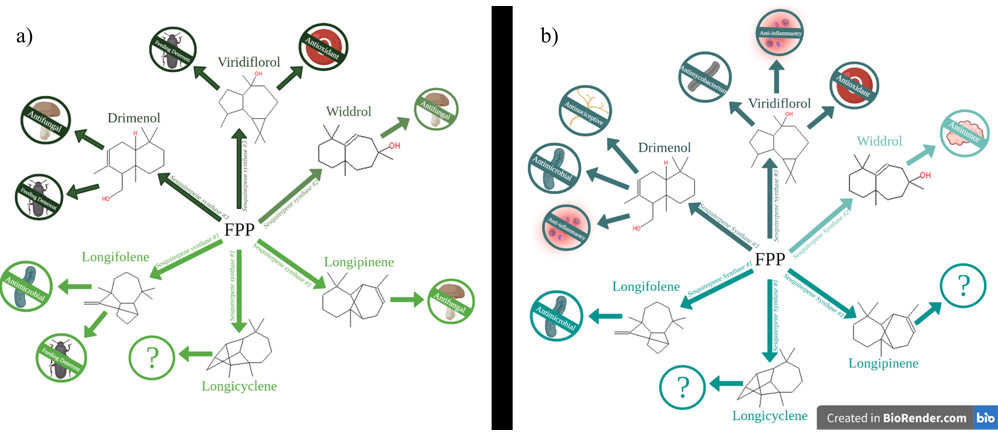 Hannah Hendrickson, NIH Trainee 2021-2023
Hannah Hendrickson, NIH Trainee 2021-2023
Graduate Program: Plant Biology
Lab: Sibongile Mafu
Research Interests: Biochemical characterization of sesquiterpene synthase genes in Medicago truncatula to identify potentially useful natural plant products.
Research Summary
In addition to the primary metabolites they need to grow and develop, plants produce specialized metabolites that improve survivability by functioning in herbivore repellence, pollinator attraction, and pathogen resistance. Several specialized metabolites have also been found to have further uses in medicine, fragrances, cosmetics, and food additives. Uncharacterized biosynthetic genes in plant genomes suggest that plants make a variety of these metabolites, but the identities and associated biological roles of many remain unknown. This presents a major limitation to the utilization of these natural products.
Our lab focuses on the terpene family of specialized metabolites. The formation of terpenes in plants is regulated primarily by terpene synthases, which cyclize carbon backbones into a wide variety of products. Study of these terpene synthases, and prediction of their products, can be challenging due to the high sequence similarities between terpene synthase genes and the promiscuity of these enzymes. My current research focuses on the isolation and identification of sesquiterpene products in the legume family host Medicago truncatula. Sesquiterpenes are an understudied class of terpenes identified by fifteen carbon backbones and synthesized from farnesyl diphosphate (FPP) precursors. To study sesquiterpenes in Medicago, we carried out in-silico analysis for identification of candidate genes and biochemical characterization of sesquiterpene synthase genes. Codon optimized synthetic constructs of sesquiterpene synthases were cloned to an expression vector and co-transformed with the precursor FPP synthase into engineered E. coli host cells for recombinant expression of each synthase and subsequent analysis by GC-MS. From expression of three terpene synthase genes, I have identified terpene synthase metabolites with potential pesticidal properties including antifungal or herbivore repellent activities, as highlighted in Figure 1a. In addition to agricultural applications, several of these metabolites also have potential medicinal uses (Fig. 1b). These potential products and their functions will be further investigated through in planta study. Continuous achievements in the isolation and identification of terpenes and other specialized metabolites aids in the discovery of novel compounds that can be used to improve crops or develop new products.
Figure 1. Potential products identified through GC-MS analysis of sesquiterpene synthase gene expressions and their potential natural biological (a) and medicinal (b) functions.

